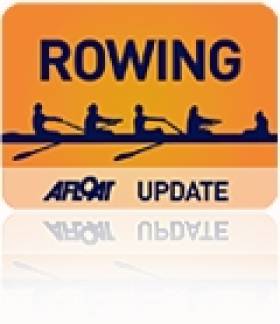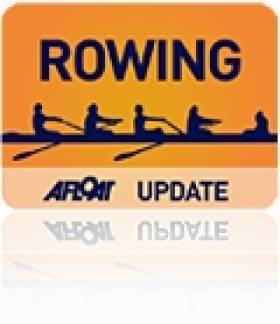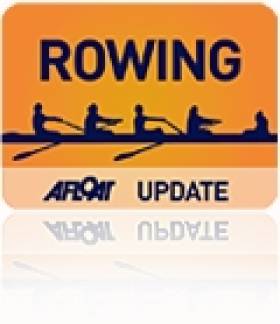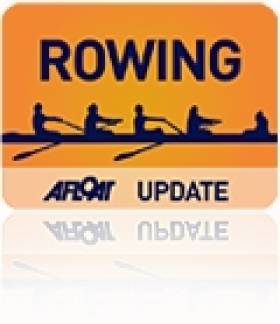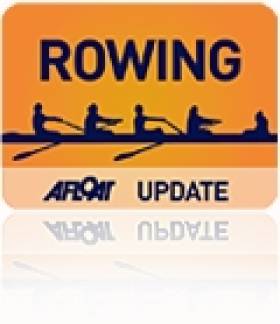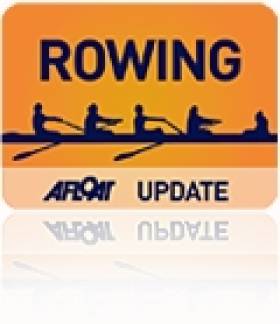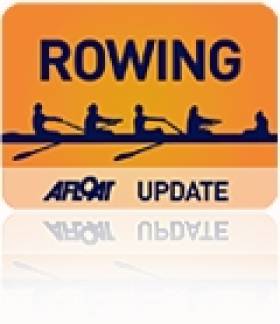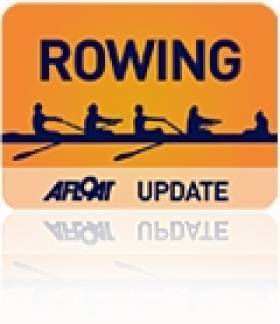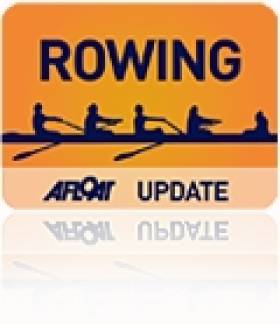Displaying items by tag: Rowing,
# ROWING: Ireland’s Sanita Puspure faces a tough task tomorrow (Tuesday) if she is to attain her aim of qualifying for the Olympic semi-finals in the single sculls. In an ironic twist, she will most probably have to finish ahead of Genevra (Gevvie) Stone of the United States in their quarter-final to qualify. Three go through, and Mirka Knapkova of the Czech Republic and Frida Svensson of Sweden will be hot favourites to take the first two places, most likely leaving Stone and Puspure to fight it out for the third qualification place. In the Olympic Qualification regatta in May, Puspure targeted finishing ahead of Stone, but saw the American produce a fine performance to finish third. Puspure then showed great determination to take out Iva Obradovic of Serbia to take the fourth qualification place.
At Dorney Lake today, the New Zealand four, which features Irishman Sean O’Neill, finished fourth in their heat and will need to compete in the repechage to go further. The dominant Australian crew won the heat and set a stunning time of five minutes 47.06 seconds. This was a new Olympic Best time. Britain were also dominant in their race, and the United States won the third heat.
Olympic Games – Rowing, Dorney Lake, Day Three (Irish Interest)
Men’s Four – Heats (First Three Directly to A/B Semi-Finals; rest to Repechage) – Heat One: 1 Australia 5:47.06, 2 Germany 5:49.84, 3 Canada 5:50.78; 4 New Zealand 5:51.84, 5 Serbia 5:53.35.
# ROWING: Sanita Puspure qualified for the quarter-finals of the women’s single scull at the Olympic Games today. The 30-year-old needed to finish in the top four to qualify and she finished in a comfortable third place, behind impressive winner Emma Twigg of New Zealand and Donata Vistartaite of Lithuania.
Coleraine men Richard and Peter Chambers had an excellent start to their Olympic campaign in the British lightweight four. They were led by Australia until the final 500 metres, but a big push by Britain made all the difference. They passed the Australians and moved away to win well.
Alan Campbell also won his heat of the single scull. Ondrej Synek of the Czech Republic and Mahe Drysdale of New Zealand were also impressive winners.
Olympic Games, London
Women’s Single Scull – Heats (First Four Directly through to Quarter-Finals; rest to repechages).
Qualifiers – Heat One: 1 New Zealand (E Twigg) 7:40.24, 2 Lithuania (D Vistartaite) 7:43.07, 3 Ireland (S Puspure) 7:49.35, 4 Brazil (K da Costa) 8:07.75. Heat Two: 1 Australia (K Crow) 7:41.18, 2 Azerbaijan (N Mustafayeva) 7:46.01, 3 Zimbabwe (M Thornycroft) 7:47.10, 4 Cuba (Y Cobas) 7:48.58. Heat Three: 1 Czech Republic (M Knapkova) 7:24.17, 2 Denmark (FU Erichsen) 7:29.37, 3 Germany (ML Draeger) 7:44.23, 4 Thailand (PN Rodenburg) 7:52.62. Heat Four: 1 China (X Zhang) 7:21.49, 2 Sweden (F Svensson) 7:32.61, 3 Paraguay (G Mosqueira Benitez) 7:52.07, 4 Japan (H Sakakibara) 7:52.98. Heat Five: 1 Belarus (E Karsten) 7:30.31, 2 Russia (J Levina) 7:32.06, 3 United States (G Stone) 7:33.68, 4 Mexico (D Oakley Gonzalez) 8:00.17.
# ROWING: Ireland's sole rowing Olympian, Sanita Puspure, has a reasonably good draw in Saturday's first heat of the single scull (1.30). She is set to compete in lane six, with lane five taken by Emma Twigg of New Zealand, a bronze medallist in the last two World Championships. The woman who finished ninth at the 2011 World Championships, Donata Vistartaite of Lithuania, is in lane two, while Iran (lane one), Argentina (three) and Brazil (four) compete the draw. Four of the six will go directly into the Quarter-Finals on Tuesday.
# ROWING: Ireland’s Brooke Edgar and Aoife Cooper, who took silver on Saturday, had to settle for fourth in the pairs race at the Coupe de la Jeunesse in Spain today. They were challenging for second until the closing stages, but Italy and Britain took the silver and bronze behind Spain, who led all the way down the course.
The Ireland men’s four and double scull took sixth, while the men’s quadruple were second in their B Final and the women’s quadruple third in theirs.
Coupe de la Jeunesse, Banyoles (Day Two, Irish interest)
Men
Four – Heat Two: 3 Millar/Seaman/Tolan/Egan 6:32.73. A Final: 6 Ireland 6:51.07.
Sculling, Quadruple – Heat One: 4 Ireland 6:16.04. B Final: 2 Ireland 6:22.74
Double – Heat Two: 1 Griffin/Quinlan 6:46.38. A Final: 6 Ireland 7:00.90
Women
Pair – Heat Two: 2 Edgar/Cooper 8:05.60. A Final: 4 Ireland 7:50.47.
Sculling, Quadruple – Heat One: 5 Ireland 7:14.80. B Final: 3 Ireland 7:15.96.
# ROWING: Wales sprung a surprise by winning the men’s senior category at the Home Countries’ International Regatta in Cardiff. England had over a decade of dominance in this class at the event. Ireland had eight race wins, and finished second in the senior women's class and third in the junior men's - just two points off winners England. Ireland’s senior women won in the quadruple, double and single sculls and the junior men won quadruple, double and coxless fours. The junior women won the single scull (Ella Cialis). Ireland’s senior men’s quadruple won in an extremely tight finish.
Home Countries’ International Regatta, Cardiff, Saturday
Final Team Positions
Men, Senior: 1 Wales 36 points, 2 England 25, 3 Ireland 22, 4 Scotland 14. Junior: 1 England 22, 2 Wales 21, 3 Ireland 20, 4 Scotland 6.
Women, Senior: 1 England 34, 2 Ireland 27, 3 Wales 20, 4 Scotland 16. Junior: 1 England 24, 2 Scotland 18, 3 Ireland 15, 4 Wales 14.
ROWING: Ireland took a silver medal at the Coupe de la Jeunesse today in Banyoles in Spain. The Bann/Muckross pair of Brooke Edgar and Aoife Cooper rowed really well in the final 500 metres to press winners Spain and give the crowd something to cheer as the rest of the crews fell off the pace. Italy took the bronze medal.
Ireland also had a fifth placing for the men's quadruple and a sixth for the men's four.
Coupe de la Jeunesse, Banyoles (Day One, Irish interest)
Men
Four – Heat One (Three to A Final): 3 H Millar, L Seaman, F Tolan, J Egan 6:29.56. A Final: 6 Ireland 6:37.93.
Sculling, Quadruple – Heat One (Three to A Final): 3 A Burns, J Mitchell, J Casey, P Hegarty 6:07.86. A Final: 5 Ireland 6:26.08
Double – Heat One (Three to A Final; rest to B Final): 4 A Griffin, D Quinlan 6:44.13
Women
Pair – Heat One (Three to A Final): 3 B Edgar, A Cooper 7:48.54. A Final: 1 Spain 7:44.93, 2 Ireland 7:48.95, 3 Italy 7:53.07.
Quadruple – Heat One (Three to A Final; rest to B Final): 5 A Crowley, L Litvack, S Allen, S Higgins 7:12.19. B Final: 3 Ireland 7:19.05.
# ROWING: Three of Ireland’s five crews qualified for A Finals on the first day of the Coupe de la Jeunesse, the European junior rowing tournament, in Banyoles in Spain today. The men’s four, men’s quadruple scull and women’s pair all finished third in their heats and will be in the hunt for medals later today.
Coupe de la Jeunesse, Banyoles (Irish interest)
Men
Four – Heat One (Three to A Final): 3 H Millar, L Seaman, F Tolan, J Egan 6:29.56.
Sculling, Quadruple – Heat One (Three to A Final): 3 A Burns, J Mitchell, J Casey, P Hegarty 6:07.86.
Double – Heat One (Three to A Final; rest to B Final): 4 A Griffin, D Quinlan 6:44.13
Women
Pair – Heat One (Three to A Final): 3 B Edgar, A Cooper 7:48.54.
Quadruple – Heat One (Three to A Final; rest to B Final): 5 A Crowley, L Litvack, S Allen, S Higgins 7:12.19.
Pollock Talk at Trinity to Aid Special Olympics Ireland
# NEWS: The adventurer and former Trinity oarsman Mark Pollock will give a talk next Wednesday, July 25th, at 7pm in the Edmund Burke Theatre, Trinity College. Pollock continued to row even after he lost his sight at 22 and he took on major challenges, becoming the first blind man to hike to the South Pole. He became paralysed after a fall in July 2010 and has been seeking ways to learn to walk again. He will share with the audience his story, as a man with normal fears and doubts facing extraordinary challenges. Tickets are €20.
# ROWING: Grainne Mhaol/NUIG won an exciting senior eights final at the Irish Rowing Championships at the National Rowing Centre in Cork today. Queen’s University fought it out with the crew from the Galway college and their old boys’ club, but a Grainne Mhaol/NUIG push in the final 250 metres gave them the big prize in a close finish. The victorious crew dedicated the win to Tom Tuohy, the long-time NUIG coach who died last year in his mid fifties.
Queen’s, in combination with Skibbereen, rowed well to win the women’s senior eights crown, and Portora’s Lloyd Seaman and Henry Millar also impressed as they won the men’s junior pairs title. Amy Bulman of UCD had one of the tightest margins of the three days of the Championships as she beat Karen Corcoran-O’Hare by .34 of a second in the women’s intermediate single sculls final.
UCD won the men’s intermediate double sculls, while Trinity concluded a very good Championships by winning the women’s novice eight. Skibbereen moved their overall total to 136 titles as they won the women’s junior quadruple scull.
Irish Rowing Championships, Day Three (Selected Results)
Men
Eight – Senior: 1 Grainne Mhaol/NUIG 5:38.47, 2 Queen’s 5:40.25, 3 Trinity 5:53.82, 4 St Michael’s 5:57.31.
Four, coxed - Novice: 1 Queen’s 6:32.18, 2 UCC 6:37.29, 3 UCD 6:41.37.
Pair – Intermediate: 1 NUIG 6:50.70, 2 UCD 6:53.88, 3 Lee Valley 6:58.90. Junior: 1 Portora 6:54.35, 2 Commercial 7:01.33, 3 St Joseph’s 7:13.00.
Sculling,
Double – Intermediate: 1 UCD 6:35.90, 2 Neptune 6:38,37, 3 Skibbereen 6:45.99. Junior: 1 Shandon 6:54.84, 2 Skibbereen 6:46.49, 3 Lee 6:48.16.
Single – Senior: 1 Lee Valley (J Keohane) 7:00.30, 2 UCC (N Kenny) 7:03.51, 3 Skibbereen (P O’Donovan) 7:10.09, 4 Offaly (O’Donoghue) 7:26.29, 5 Carlow (Bolger) 7:27.10. UCD (Neale) Dnf.
Women
Eight – Senior: 1 Queen’s LBC/Skibbereen 6:25.48, 2 UCD 6:30.19, 3 Trinity 6:30.40, 4 St Michael’s 6:40.28, 5 NUIG 6:41.79. Novice: 1 Trinity 6:51.68, 2 UCD 6:54.72, 3 NUIG 6:57.71.
Four, coxed – Intermediate: 1 St Michael’s 7:11.00, 2 UCD 7:23.15, 3 NUIG 7:27.26.
Pair – Junior: 1 Bann 7:44.22, 2 Muckross 7:45.21, 3 Cork BC 7:54.81.
Sculling, Quadruple – Junior: 1 Skibbereen 6:55.31, 2 Cork 7:02.99, 3 Shandon 7:04.47.
Single – Senior: 1 Three Castles (H Walshe) 7:42.45, 2 Killorglin (M Dukarska) 7:42.85, 3 Three Castles (E Moran) 7:55.91, 4 Belfast BC (B Jacques) 7:59.48, 5 Three Castles (B Quinn) 8:06.22, 6 Skibbereen (O Hayes) 8:08.54. Intermediate: 1 UCD (A Bulman) 8:04.33, 2 Shandon (K Corcoran-O’Hare) 8:04.67, 3 Trinity (S Dolan) 8:16.55.
# ROWING: For the second year in succession, the final of the women’s senior single scull produced a dramatic finish at the Irish Rowing Championships. Last year Monika Dukarska of Killorglin fell in when within metres of a win, and this year she seemed certain to make amends as she passed Helen Walshe of Three Castles and drove for the line at the National Rowing Centre. But Walshe, who won in 2004 and 2006 for UCD, mounted her own charge and won by .4 of a second.
John Keohane of Lee Valley won the men’s senior single with plenty to spare and there were emphatic wins for Queen’s (in the men’s novice coxed four); NUIG (men’s intermediate pair) and St Michael’s (women’s intermediate coxed four).
Shandon had to hold off a late push by Skibbereen in the men’s junior double scull and the women’s junior pair was also a tremendously close race, with Bann coming out on top in a battle with Muckross.
Irish Rowing Championships, Day Three (Selected Results)
Men
Four, coxed - Novice: 1 Queen’s 6:32.18, 2 UCC 6:37.29, 3 UCD 6:41.37.
Pair – Intermediate: 1 NUIG 6:50.70, 2 UCD 6:53.88, 3 Lee Valley 6:58.90.
Sculling,
Double – Junior: 1 Shandon 6:54.84, 2 Skibbereen 6:46.49, 3 Lee 6:48.16.
Single – Senior: 1 Lee Valley (J Keohane) 7:00.30, 2 UCC (N Kenny) 7:03.51, 3 Skibbereen (P O’Donovan) 7:10.09, 4 Offaly (O’Donoghue) 7:26.29, 5 Carlow (Bolger) 7:27.10. UCD (Neale) Dnf.
Women
Four, coxed – Intermediate: 1 St Michael’s 7:11.00, 2 UCD 7:23.15, 3 NUIG 7:27.26.
Pair – Junior: 1 Bann 7:44.22, 2 Muckross 7:45.21, 3 Cork BC 7:54.81.
Sculling, Single – Senior: 1 Three Castles (H Walshe) 7:42.45, 2 Killorglin (M Dukarska) 7:42.85, 3 Three Castles (E Moran) 7:55.91, 4 Belfast BC (B Jacques) 7:59.48, 5 Three Castles (B Quinn) 8:06.22, 6 Skibbereen (O Hayes) 8:08.54.



























